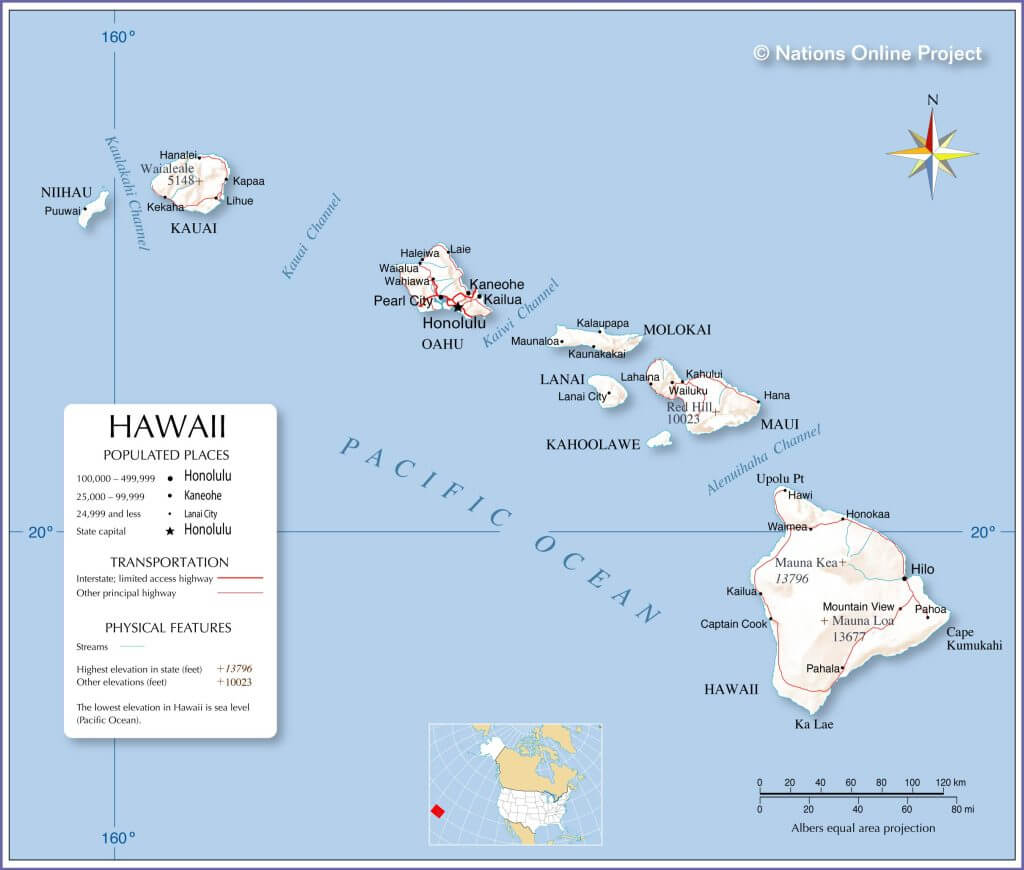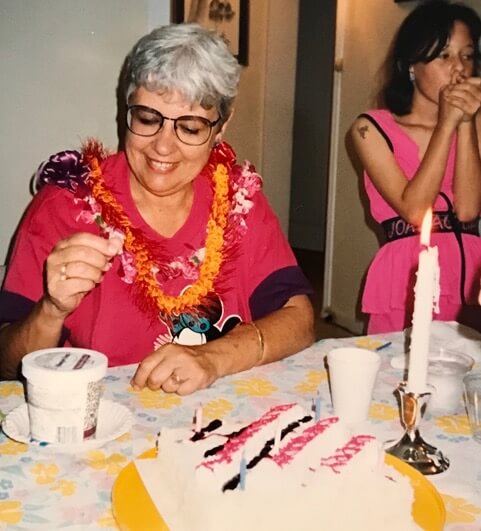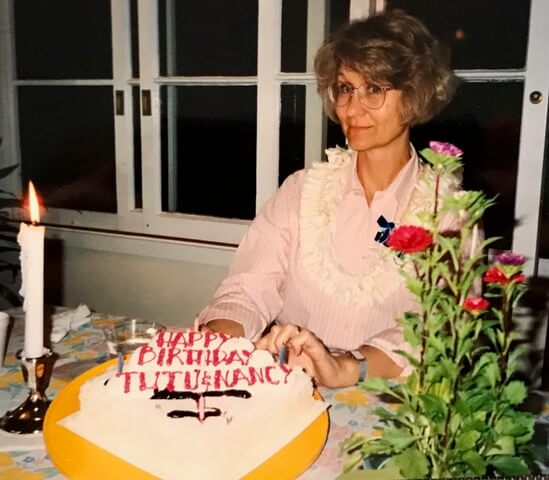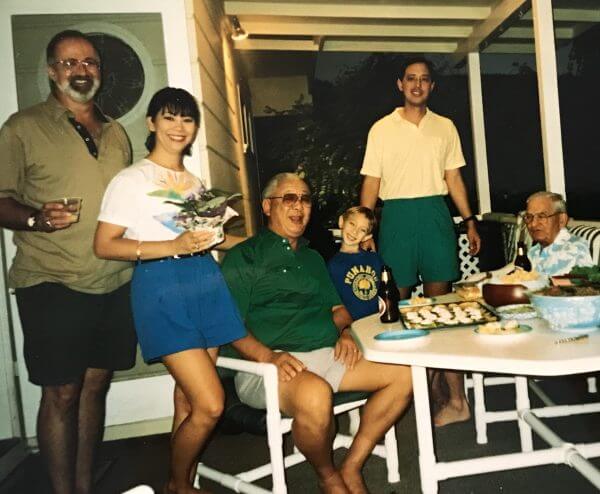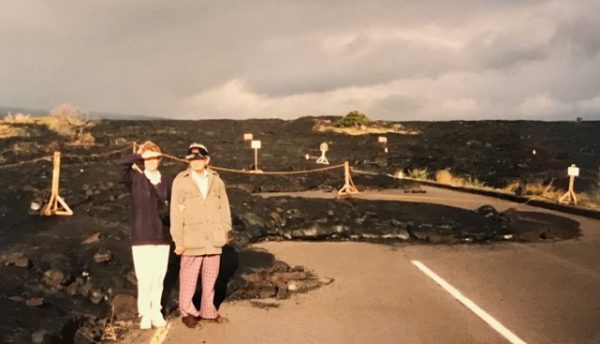#28: Hawaii Sojourn, 1993-94
In May 1993, as we were preparing to leave Laos after more than two years, Russell received an invitation from the East-West Center in Hawaii to serve as a Centerwide Fellow. Joking that we hoped the title wasn’t a comment on his waistline, we boarded a plane in Vientiane, our arms filled with flowers from friends and graced with white cotton cords from our farewell baci [see post #21 for a description of this ceremony]. After an R&R stopover in Penang, Malaysia, we visited family on both coasts of the Mainland before taking up residence in beautiful Manoa Valley, the former seat of Hawaiian royalty.
Somehow, the only letters I could find were from our last three months there, but I have a lot of photos. So I’ll share some recollections prompted by those images before adding excerpts from the letters. (Click on photos to enlarge.)
We were both looking forward to living in Hawaii. When I’d attended the East-West Center’s introductory program for Asian Seminar 1964, I’d written in my journal that I would like to live there one day. Subsequently, Russell and I had been tourists in Hawaii. Now we were going to take up residence, pretty sure it would be different from being there as a tourist or a student.
And it was. We were fortunate to find an apartment in Manoa, so Russell could walk to work. Even luckier to be adopted into the extended family of our landlord, so that we had a broader experience of Hawaii’s gracious, multicultural way of life.
The Hawaiian word “Aloha” means “love” in English, and the Lum family was full-to-bursting with it, always ready to share. Grandfather KH and Grandmother (“Tutu”) Diane seemingly invited us to every family event. When Tutu and I discovered that she would be 60 on March 6th and I would be 50 on March 5 of 1994, that was a great excuse for another party. And they never failed to include my Dad during his several visits while we were in the Islands. KH and Diane are gone now, but they will always live in my heart.
Dad so fell in love with Hawaii that he bought a special package of air tickets so he could come again and again — at least three times during the 18 months we were there. His May ’93 visit was especially memorable. When we toured Pearl Harbor, the servicemen who escorted us were particularly respectful to this aged veteran of WWII. It didn’t matter that he was Army, and they were Navy. He’d served, and that was enough.
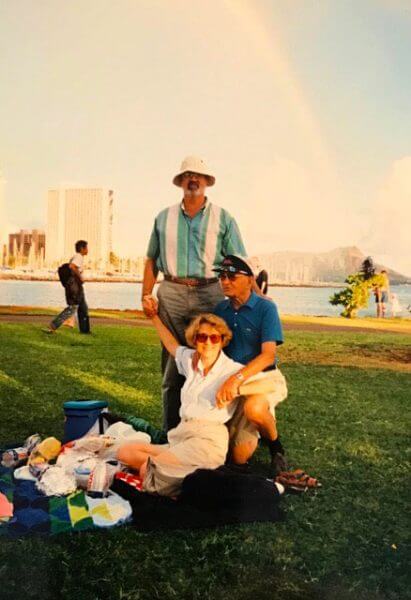 During that same visit, we travelled to the “Big Island” of Hawaii, seeing the decade-long eruption of Kilauea, engulfing houses, blocking highways and still in flow to the sea, where it sizzled in the surf.
During that same visit, we travelled to the “Big Island” of Hawaii, seeing the decade-long eruption of Kilauea, engulfing houses, blocking highways and still in flow to the sea, where it sizzled in the surf.
Although the site of specific eruptions has shifted over the years, Kilauea is still active and likely to be so for some time.
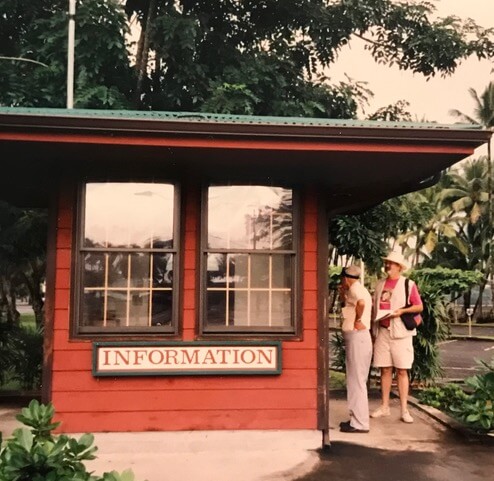 Little did we know when we stopped by Hilo’s Information booth on the Big Island’s north shore, that this visit would save our lives. In April 1946, a tsunami hit Hilo with a wave three stories high, destroying most of the town and killing 96 people. After the first wave receded, the water in the bay disappeared, and boats were left on the sea bed along with flopping fish. Those who ran out to collect the fish were killed when the second wave struck. We toured the exhibits of this dreadful history, awed by the destruction, unaware that this knowledge would save us when a tsunami pounded Sri Lanka ten years later.
Little did we know when we stopped by Hilo’s Information booth on the Big Island’s north shore, that this visit would save our lives. In April 1946, a tsunami hit Hilo with a wave three stories high, destroying most of the town and killing 96 people. After the first wave receded, the water in the bay disappeared, and boats were left on the sea bed along with flopping fish. Those who ran out to collect the fish were killed when the second wave struck. We toured the exhibits of this dreadful history, awed by the destruction, unaware that this knowledge would save us when a tsunami pounded Sri Lanka ten years later.
It may sound like all we did was tootle around in Hawaii, but we both devoted most of our time to professional endeavors. Russell’s fellowship at the East-West Center was founded to encourage international-development practitioners to take a sabbatical from fieldwork and record ground-level knowledge complementing the Center’s academic research. He wrote two books for developing-country governments published by the EWC: one on managing foreign investment, the other on managing foreign consultancies. He also traveled to Manila as a member of the EWC’s multidisciplinary team of experts advising the Philippine government on reforming its foreign-investment regime.
Meanwhile, I was busy with my own book. As usual, I’d tried to write mostly positive things in my family letters from Vientiane. But my life there had a dark side that I didn’t write home about. It was one of the worst periods in my life, and I observed it was also a difficult time for many dependent spouses. I resolved to turn those experiences into an account of what it’s like to be a dependent adult, sans real work in a politically and culturally restrictive setting. At first I thought of a nonfiction discussion of these challenges. But then I realized that few, if any, would be interested in such a book, and that a mystery set in Vientiane and featuring expatriate women’s lives might have a wider audience. This was the impetus for Malice on the Mekong, published decades later, after I perceived similar experiences in other settings, including how male dependent spouses found that status destructive.
I’d spent most of my life writing articles for all sorts of publications, as well as reports, workbooks, scripts and other materials for adult-learning projects. But, except for English-class exercises, I’d never written fiction. I was decidedly wary of attempting dialogue, so I thought I’d come up with a solution when I cranked out a first draft, written in a sort of Rashomon-style narrative, with each character telling the story from his/her viewpoint. Boring book! But I didn’t have a clue about how to proceed. Fortunately, a seminar at the University of Hawaii started me on a new path toward finally, after many drafts, arriving at something publishable.
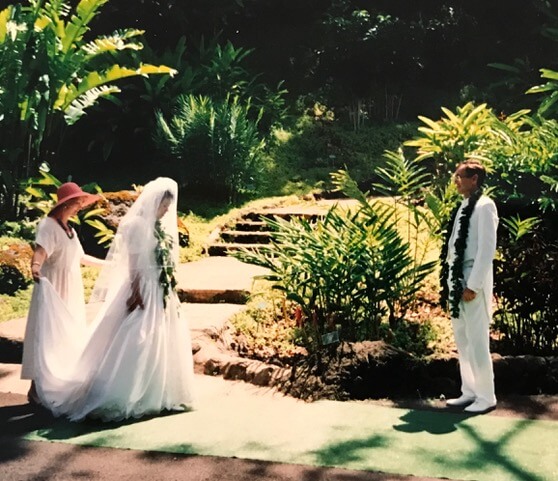 As we neared the end of our sojourn in Hawaii, we were pleased to be among the small number of guests at the wedding of good friend Charles Johnson and his bride, Xiaodong Wang. I was touched to be asked to serve as Xiaodong’s matron of honor, helping first with professional make-up and coiffeur (the first ever for this Chinese citizen) and later with her train and the usual duties of the MOH. A very moving experience, as these two were building bridges across the cultural and political divide.
As we neared the end of our sojourn in Hawaii, we were pleased to be among the small number of guests at the wedding of good friend Charles Johnson and his bride, Xiaodong Wang. I was touched to be asked to serve as Xiaodong’s matron of honor, helping first with professional make-up and coiffeur (the first ever for this Chinese citizen) and later with her train and the usual duties of the MOH. A very moving experience, as these two were building bridges across the cultural and political divide.
Transitions from one site to another are always stressful for those in the international life. But our move from the one place on earth farthest from land to the one place on earth farthest from the sea proved to be our most challenging. Here are some edited excerpts from family letters during our last three months in Hawaii.
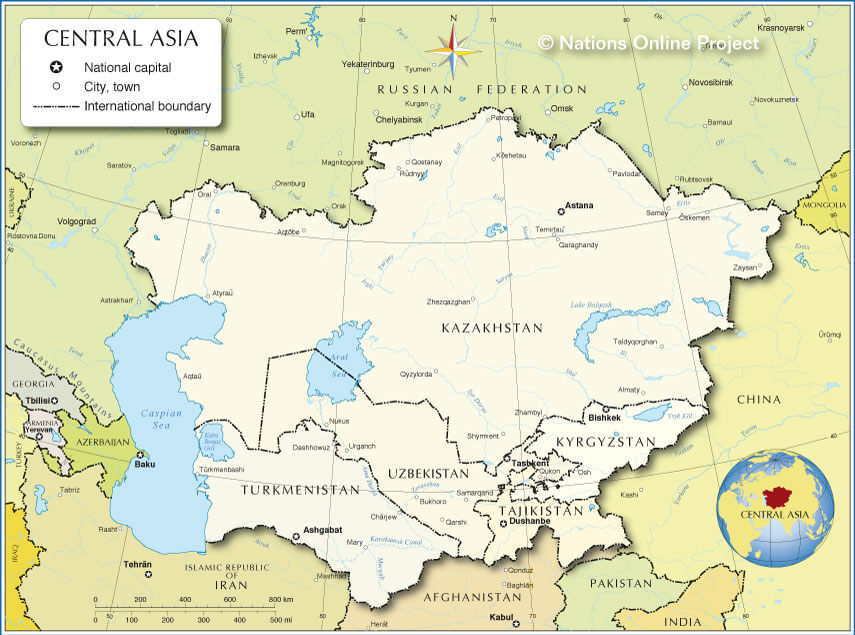
October 16, 1994
As I believe you know, Russell was contacted in early August about a position as Field Director [i.e., Manager] for a project involving the five former Soviet Central Asian Republics. The consulting firm in charge of the project flew him to DC for interviews, liked what they saw and proposed his name to the U.S. Agency for International Development, which is funding and administering the project. Then they asked him to come to Almaty, Kazakhstan, where the project is headquartered, for a series of meetings with USAID Mission staff and the firm’s in-country project staff.
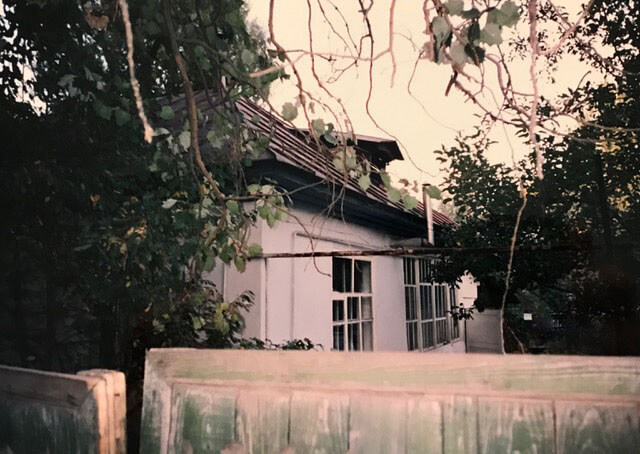 I’m feeling very enthusiastic about the change in our lives. As his photos show, it’s not a city of East-Berlin-like Soviet architecture. There are many older buildings and houses which give the city charm. Almaty is full of trees, making each street park-like. I’m really looking forward to fixing up one of these old houses — much rather have that than one of the modern apartments in which some project staff are living. It’ll be fun to restore one of these old ladies back to her original glories, plant a garden, train a puppy and give a kitten a home.
I’m feeling very enthusiastic about the change in our lives. As his photos show, it’s not a city of East-Berlin-like Soviet architecture. There are many older buildings and houses which give the city charm. Almaty is full of trees, making each street park-like. I’m really looking forward to fixing up one of these old houses — much rather have that than one of the modern apartments in which some project staff are living. It’ll be fun to restore one of these old ladies back to her original glories, plant a garden, train a puppy and give a kitten a home.
October 31, 1994
Russell will leave here December 10 and go to Almaty via Bangkok and Istanbul for year-end meetings. In the meantime, I’ll “pack, pay and follow” — have a garage sale, get some stuff stored and other stuff packed for shipment, close down the house, etc. I’ll leave here December 23 and meet Russell in LA for holidays with his brothers.
We’ll then go on to Fredericksburg [our home base at the time], where we’ll open storage there and get out our winter duds. We’ve been ordering a lot of gear from catalogs like L. L. Bean (arctic boots, heavy down coats, long johns, etc.), but that’s to supplement what we already have. We’ll still need our wool clothes, regular winter boots, flannel sheets, etc. from Virginia.
R will go on to DC for meetings, while I head south to see the far-flung Swings. We’ll then meet back in DC during the last week of January and fly to Almaty via Frankfurt, arriving at the end of the month.
In the meantime, we’re working like mad to get ready. We’ve basically given up weekends, because there’s so much to do. This past weekend, for example, we had to try to find winter clothes because Russell is now going out to Almaty in December, before we can get into our Virginia storage. This is a tricky proposition. The snooty manager of the men’s section of our biggest department store told Russell, “As you might imagine, we only offer tropical attire here.” Russell had the wit to respond, “As you might imagine, many of us who live here must periodically travel to colder climates.” At any rate, thanks to Banana Republic, which ships the same clothes to all its nationwide stores regardless of location, we were able to find two wool jackets and two pairs of wool trousers. This is the sort of thing we can’t safely order — R really must try on jackets and trousers to be sure they fit. Hopefully, R’s arctic boots and down coat will arrive here in time for him to wear them in December.
November 21, 1994
Our physical exams had good results, and we’ve both ordered new [eye] glasses. We’re getting shot for rabies, meningitis, typhoid, influenza and tick-borne encephalitis. Plus boosters for tetanus, polio, etc. Do I need to say we feel like pin cushions? Just before we depart for Almaty, we’ll get a big shot of gamma globulin in the fanny. Fortunately, we were already immunized for Hepatitis B in Laos, so we can skip that one for now.
We’re trying to figure out what to store and what to take. The U.S. Government regulations about pounds allowed for each category are just as complicated as you might imagine. Basically, we get 450 pounds of unaccompanied air freight and up to 7200 pounds of sea freight. We’re allowed up to 18,000 pounds of storage, less whatever pounds are shipped sea freight. So far, not too complicated. But it’s recommended that we convert our 7200 pounds of sea freight to the “equivalent” (but lesser amount) of air freight because it takes eight months for sea freight to arrive in Central Asia with the potential for pilfering en route. It costs more to ship from Hawaii than from Virginia. So what’s the conversion factor for each one? It truly gives you a headache. I’ve no doubt it’ll all be sorted out in time, but it’s not exactly a fun way to spend a weekend.
* * *
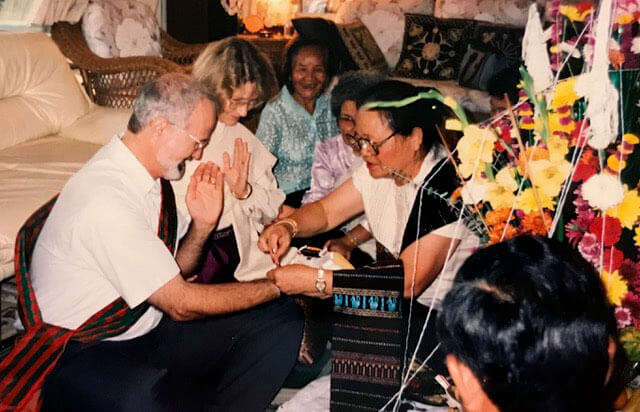 A short insert here to mark the kindness of Puongpun Sananikone and his wife Thanlo in hosting a farewell baci for us on November 24. It seemed as if the entire community of Lao refugees living on Oahu attended, sharing their blessings, Lao dishes and the lamvong, a slow and stately circle dance which we managed without disgracing ourselves. When I described, in Post #25, having to cancel our plans for a shared 50th wedding anniversary with the Australian Mann family in Hawaii, I didn’t mention that I had hoped to have a baci as part of the festivities. Oh, how I wanted to share that ceremony with our nearest and dearest, but it wasn’t to be.
A short insert here to mark the kindness of Puongpun Sananikone and his wife Thanlo in hosting a farewell baci for us on November 24. It seemed as if the entire community of Lao refugees living on Oahu attended, sharing their blessings, Lao dishes and the lamvong, a slow and stately circle dance which we managed without disgracing ourselves. When I described, in Post #25, having to cancel our plans for a shared 50th wedding anniversary with the Australian Mann family in Hawaii, I didn’t mention that I had hoped to have a baci as part of the festivities. Oh, how I wanted to share that ceremony with our nearest and dearest, but it wasn’t to be.
* * *
December 2, 1994
Our main difficulty continues to be the shipping of our goods to Almaty. Despite what we’d been told, some contract officer is now saying we can only ship from one place; i.e., either from Hawaii or from Virginia but not both. We’re making the argument that:
- All our winter clothes are in Virginia, except for recent special purchases for the extreme climate of Kazakhstan;
- We had previously been assured that there would be no problem shipping some items from here and some from Virginia;
- We therefore had the items purchased from L. L. Bean etc. shipped to Hawaii so we could inspect them and be sure that the orders were properly filled;
- Is it really reasonable to ask us to give up either our winter clothes in Virginia or our household and extreme cold weather gear here?
The woman in the consulting firm’s home office who knows most about shipping returns from Almaty to DC on Monday. We’re hopeful her intervention will save the day. Russell, as usual, remains calm. I, as usual, had a two-minute burst of anger when I got the news and have subsequently let go. We’ll make the good fight and see what happens.
December 15, 1994
I’ve had a meeting with the local vet about selecting, feeding and caring for a dog and a cat in Central Asia. I’ve got recipes for make-you-own-dog- and cat-food, dietary supplements for fast-growing large dogs, medications for ear infections, etc. etc. I feel like I could open a vet clinic myself.

COMING NEXT MONTH
Almaty, Kazakhstan, 1995: Early Days
5 trunks, 4 carry-ons, 3 suitcases, 3 Valodyas, 1 Alexandra and 10 houses later,
maybe we’ve found a home at last.

LET ME HEAR FROM YOU.
Please take a moment to share your thoughts.
Your comments help make the blog better, and I always answer.
* * *
If you enjoyed reading this post, I hope you’ll SUBSCRIBE by clicking on the button below. Every month, when I post a new excerpt from my life overseas, you’ll get an email with a link so you can read the next installment. Subscription is free, and I won’t share your contact information with anyone else. Your subscribing lets me know you’re reading what I write, and that means a lot.

